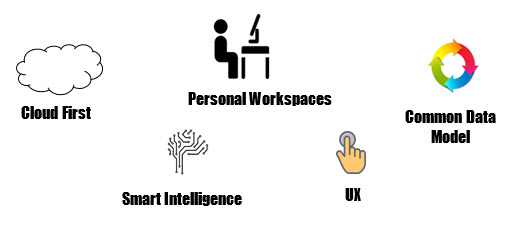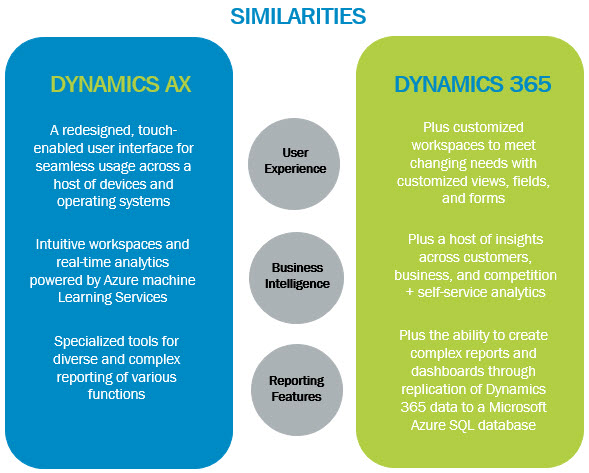April 10, 2023 - by Manoj Nair
Choosing the right ERP has always been a major challenge for businesses around the globe. The decision to opt for an ERP solution is a difficult one, but given the benefits, it makes total sense for your organization to have a system in place that streamlines the way you conduct business. As of 2023, Microsoft has ended all mainstream support for Dynamics AX 2012, Dynamics AX 2012 R2, and Dynamics AX 2012 R3. Since Dynamics AX is no longer receiving any future updates or patches, current AX users must consider upgrading their ERP systems to Dynamics 365. The good news is that Dynamics 365 can be deployed locally, so AX users can reap most of the benefits of Dynamics 365.
An Overview of Dynamics AX and Dynamics 365

Like Microsoft Dynamics AX, Dynamics 365 offers a comprehensive range of modern capabilities that make running a business easy and efficient. Investing in Microsoft’s ERP can enable businesses to:
Make Smarter Business Decisions
While Dynamics AX was primarily an on-premises ERP solution providing the core functionality you need to make smart business decisions, Dynamics 365 is available as a cloud or hybrid solution bringing the power, speed, and intelligence of cloud computing to enable organizations to make smarter business decisions and achieve more.
Improve Day-to-Day Efficiency
The personal workspace concept aids you in doing your day-to-day tasks easily and quickly. With a list of suggested priorities, users can first take up tasks that need special attention, and make sure they meet the required deadlines.
Enjoy Seamless User Experience
With the all-new user experience, users can work anytime, anywhere, and from any device. The natural UI accelerates adoption while raising productivity and user satisfaction. The seamless touch interface facilitates smooth access on multiple devices, allowing you to get all your work done in time.
Get Deeper Insight into the Business
The built-in smart intelligence and the combination of Cortana Intelligence, Power BI, and Azure Machine Learning built in enables deep insights into business performance. With Microsoft ERP, you can create stunning interactive reports, get the intelligence you need, and answers to your questions through rich visuals and dynamic charts on the device of your choice.
Simplify Data Management
The presence of the Common Data Model (CDM) helps in simplifying data management and integration across apps and business processes. Users can analyze massive amounts of data to get a unified view, connect this data with information in other Microsoft apps, and empower employees to maximize results. They can also build custom entities specific to their business domain and connect them to Microsoft developed apps or third-party apps for added customization.
Enjoy Frequent Updates
With Microsoft ERP, you no longer have to worry about lengthy and tedious software implementation. The cloud-based solution allows users to receive automatic notifications if updates are available, ensuring your business has the most up-to-date version with the click of a button.
Enjoy More Flexibility
By embracing a cloud or hybrid-based solution, you can maintain low overhead costs for computing, licensing, and maintenance as these are all included with your subscription. These deployment models offer flexible pricing plans so you only pay for what you need and can open the door for more organizations to explore Dynamics 365 capabilities. Such automatic updates minimize errors and capabilities for global scalability to businesses of all sizes.
Receive Continuous Support
For many years now, Microsoft has been pushing users to gravitate toward more cloud-based solutions. Not only does it improve operational efficiency, but it also makes financial sense as we move into the future. Since security hotfixes and extended support for Dynamics AX have ended, businesses must make the move to Dynamics 365 to receive continuous support.
What Makes Dynamics AX and Dynamics 365 Similar?
Both Dynamics AX and Dynamics 365 are similar in a lot of ways: built-in with exceptional Business intelligence capabilities, offering a stunning user experience, and enabling you to develop stunning dashboards through its high-end reporting features.

Dynamics AX vs Dynamics 365: What Makes Them Different?
Simply put, Dynamics AX is a desktop-based application and Dynamics 365 is primarily a web and cloud-based solution.
While Dynamics AX and Dynamics 365 are similar in many ways, there are an overwhelming number of differences between the two of them – from the infrastructure on which they both are deployed, to their licensing options, integration capabilities, and scalability and development options.
Below you will find a chart that provides a solid overview of the key differences between Dynamics AX and Dynamics 365.
When Did Dynamics AX Support End?
Dynamics AX 2012 and R2 mainstream support ended on October 9, 2018, and AX 2012 R3 on October 12, 2021. Extended support ended on October 12, 2021, for AX 2012 and R2, and AX 2012 R3 ended on January 10, 2023.
Is Dynamics 365 Available On-Premises?
Yes, you can deploy Dynamics 365 on-premises. No upgrades are required for AX on-premises users since Dynamics 365 can now be deployed locally and online. However, Dynamics 365 for Retail is not available for on-premises deployment.
Dynamics AX vs Dynamics 365: Which Is Better?
As markets mature, industries undergo transformation, and technological innovations become more and more pervasive, getting insights into your business, competition, and customers is critical for success. Microsoft Dynamics AX and Dynamics 365 are built with analytics at the foundation, offering you the insights required for business excellence.
But with Microsoft no longer supporting Dynamics AX instances, it’s time to make the move. With Dynamics 365, not only can you enjoy a host of modern and intelligent capabilities but you can also make the most of advancements of cloud technology, receive automatic security hotfixes, and non-stop support.
Looking for ways to get the most out of your enterprise solutions? Download our free ebook, Transform the Way You Do Business with a Unified Platform for ERP and CRM.

